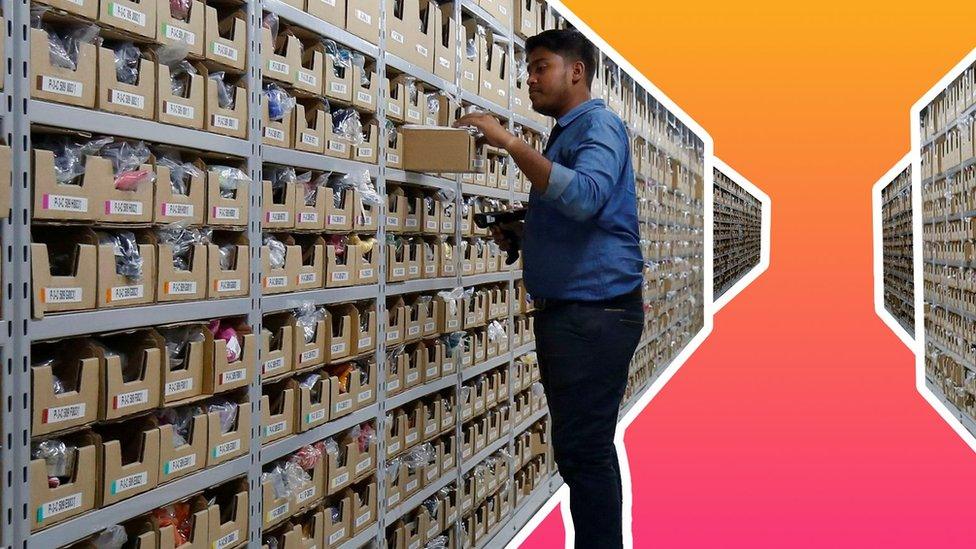Tech Tent: Big Tech and the future of work
- Published

Amazon has hired more people during the pandemic
In countries where the economy has been ravaged by the effects of the coronavirus, job losses are soaring - except in the technology sector, where companies such as Amazon are creating thousands of new jobs.
In this week's Tech Tent podcast, we look at the ever-greater influence the tech giants have over the world of work.


With millions now dependent on online shopping, Amazon has prospered during the pandemic.
It has expanded its operations rapidly. Just this week in the UK, the company announced it was recruiting another 7,000 people.
But in the United States, two of its job adverts caused controversy.
They were for intelligence analysts to monitor a number of areas, including "sensitive topics that are highly confidential, including labour-organising threats against the company".
Amazon has long been hostile to unions, preferring to talk directly to employees.
But the row that blew up over what appeared to be the start of a covert surveillance operation saw the firm drop the ads, saying they had been inaccurately worded.
Willy Solis from the Gig Workers Collective, which lobbies for workers' rights at businesses like Amazon, tells Tech Tent that he found the adverts frightening.
"It's kind of brazen and they're not afraid of showing their hand. To be surveilled by a company that large, it's pretty scary," he says.
Amazon's workforce in the United States has grown by an extraordinary 175,000 during the pandemic. Does he welcome that?
Well, there is a high turnover of staff, he explains. "People typically leave because of the work conditions or because they're being treated unfairly by the company or there are pay issues. But it's a revolving door."
As well as directly employing more than 750,000 people, Amazon is also a big force in the gig economy, with many thousands of delivery drivers and others dependent on it for their income, but not employed as staff.
It is one of a number of tech firms - Uber, Deliveroo and TaskRabbit are others - that have been part of this phenomenon, which has changed the way we see the world of work.
Sarah O'Connor of the Financial Times has been chronicling the gig economy for some years, even taking a job as a food delivery courier for one story.
She tells Tech Tent that the benefits for a company effectively making its workforce self-employed are clear: "They're fantastically cheap. You're only paying them for the minutes that they're actually performing a task."
She says some workers also value the flexibility of being able to choose their hours, although they often find the only way to make a decent living is to work when the companies want them.
What will the gig economy look like after the pandemic?
Sarah O'Connor thinks the fact that many employers have now realised their staff can work just as effectively from home will prove a light-bulb moment.
That could allow many people the flexibility they crave - or could see employers seeking cheaper alternatives.
"It might prove to employers that if you don't need people physically in the office, maybe you don't need them physically in the country," she says.
"Maybe you can start to think of the whole world as your potential workforce and recruit from anywhere. And so you could see a sort of globalisation in the way that hit blue collar workers, 20 or 30 years ago. You could see that start to hit people like you and me, people who until now have been relatively insulated from it."
The balance of power between labour and capital, the workers and corporations, has shifted in favour of business over recent decades.
Now, the advance of technology and a pandemic that has accelerated its adoption in the workplace, could mean that workers have even less power to improve their wages and conditions.
